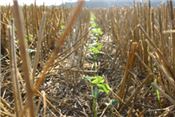|
Milan No-Till Field Day Set For July 28
Tradition Of Education Continues At Nation’s Oldest And Largest Conservation Tillage Event
MILAN, TENN.
The University of Tennessee Institute of Agriculture will host the Milan No-Till Crop Production Field Day on Thursday, July 28, 2016, at the AgResearch and Education Center at Milan. The event will offer 40 research-based presentations led by academic experts. Sessions will cover optimum management strategies for no-till crop production, including nutrient enhancement, water use, new technologies in pest control and advancements in plant breeding.
No-till farming is a practice that eliminates plowing before planting. The technique is proven to reduce both soil erosion and greenhouse gas emissions, while improving farm efficiency and the organic matter and biodiversity in farm soils.
“Since our first No-Till Field Day was held 35 years ago, we’ve made considerable gains in reducing environmental impacts,” says Blake Brown, director of the AgResearch and Education Center at Milan. “Today we continue to promote sustainable agricultural practices by introducing producers to new technology and more efficient methods.”
Visitors to the Milan No-Till Field Day can hear presentations on research involving every major row crop grown in Tennessee. Other topics of interest include weed, insect and disease management research, nutrient loss reduction strategies, cover crop management and new research findings involving pollinator health. In 2014, these educational sessions drew nearly 2,500 visitors from 19 states and multiple countries.
Additionally, visitors can participate in a hands-on community service activity titled, “Farmers vs. Hunger.” Participants will package meals to be distributed at local food banks. At the 2014 Milan No-Till Field Day, volunteers packaged more than 28,000 meals.
The event is free and open to the public. Gates open at 6 a.m. with presentations and an agricultural industry trade show beginning at 7 a.m. The field day will conclude at 2 p.m. More information, including a list of presentations, is available online at milan.tennessee.edu
The UT AgResearch and Education Center at Milan is known as the birthplace of no-till farming in Tennessee. When the Center opened in 1962, West Tennessee farmers were facing a soil erosion crisis, losing, on average, 40 tons of soil per acre per year.
West Tennessee was used as a classic bad example of erosion,” says Don Tyler, professor with UT’s Department of Biosystems Engineering and Soil Sciences. “Years of over-tilling had really taken its toll on the land, and it was hurting farm production.”
Years of research and the launch of the Milan No-Till Field Day in 1981, helped persuade farmers that they could park their plows without reducing crop yields. Today, according to the National Agricultural Statistics Service, more than 70 percent of Tennessee farmers use no-till practices, and an additional 20 percent use some type of conservation tillage. Nationally, more than 60 percent of cropland is planted using no-till or conservation tillage.
A measurable impact of no-till adaptation is a dramatic reduction in soil erosion. In Tennessee, erosion levels have decreased by approximately 80 percent in the last 50 years. Meanwhile, agricultural efficiency has greatly increased. According to the U.S. Department of Agriculture, an average farmer today feeds 155 people annually, compared to just 61 people in 1960.
“The no-till farming movement changed the way we grow food and fiber,” says Brown, “but agriculture will continue to change, especially with the demands of a growing world population. That’s why agricultural research and educational field days are so valuable.” ∆

In 1981, the Milan No-Till Field Day first promoted the benefits of no-till farming
and ushered in a new era of agricultural production. Thirty-five years later the event
continues to promote sustainable agricultural practices with 40 research-based
sessions and an extensive industry trade show. The field day is Thursday, July 28, 2016.
Photo by B. Brown, courtesy UTIA
|
|